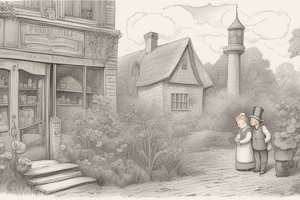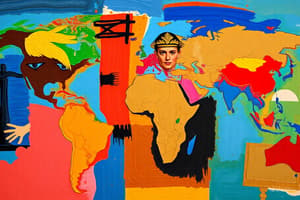Podcast
Questions and Answers
When did the Central Powers and Allied Powers finally end the four-year war in WW I?
When did the Central Powers and Allied Powers finally end the four-year war in WW I?
- November 11, 1918 (correct)
- December 7, 1941
- April 30, 1945
- June 28, 1919
What was Hitler's belief regarding the need for war?
What was Hitler's belief regarding the need for war?
- War had no impact on Germany's future development.
- War was beneficial for promoting global peace and unity.
- War was necessary for expanding German living space. (correct)
- War was unnecessary and should be avoided at all costs.
What was the impact of the Treaty of Versailles on Germany?
What was the impact of the Treaty of Versailles on Germany?
- Germany's military power and weapon stockpile increased.
- Germany gained colonial territories as part of the treaty.
- Germany allied with the Central Powers after signing the treaty.
- Germany was blamed for causing the war and had to pay reparations. (correct)
Which country invaded Poland in 1939, leading to the start of WWII?
Which country invaded Poland in 1939, leading to the start of WWII?
What was one of the key consequences of World War I on Germany?
What was one of the key consequences of World War I on Germany?
Who initiated the establishment of trade routes and colonies in the Americas, Africa, Asia, and the Pacific in the late 15th century?
Who initiated the establishment of trade routes and colonies in the Americas, Africa, Asia, and the Pacific in the late 15th century?
Which treaty officially ended WW I and imposed harsh terms on Germany?
Which treaty officially ended WW I and imposed harsh terms on Germany?
Which key inventions characterized the Industrial Revolution during the 18th and 19th centuries?
Which key inventions characterized the Industrial Revolution during the 18th and 19th centuries?
What was a major impact of the Industrial Revolution on societies across the world?
What was a major impact of the Industrial Revolution on societies across the world?
What event marked the beginning of World War I (1914 – 1918)?
What event marked the beginning of World War I (1914 – 1918)?
Which conflict involved more than 50 nations and led to the Great Depression?
Which conflict involved more than 50 nations and led to the Great Depression?
What was a consequence of the actions of European explorers in the late 15th century?
What was a consequence of the actions of European explorers in the late 15th century?
What was the main motivation for European colonial powers during the period of colonialism and imperialism?
What was the main motivation for European colonial powers during the period of colonialism and imperialism?
Which event formally recognized the independence of the Dutch Republic?
Which event formally recognized the independence of the Dutch Republic?
During the period of colonialism and imperialism, which European power sought to expand its influence through overseas exploration and conquest?
During the period of colonialism and imperialism, which European power sought to expand its influence through overseas exploration and conquest?
Which technological advancement played a significant role in fueling the Industrial Revolution?
Which technological advancement played a significant role in fueling the Industrial Revolution?
Which period saw the end of the Thirty Years’ War and recognized national self-determination as a basis?
Which period saw the end of the Thirty Years’ War and recognized national self-determination as a basis?
Which global event directly followed the period known as the Cold War?
Which global event directly followed the period known as the Cold War?
Study Notes
Colonialism & Imperialism (16th - 20th centuries)
- European explorers established trade routes and colonies in the Americas, Africa, Asia, and the Pacific through force, beginning in the late 15th century.
- Notable explorers include Christopher Columbus and Vasco da Gama.
Industrial Revolution (18th - 19th centuries)
- The Industrial Revolution transformed societies worldwide, characterized by innovations in machinery, manufacturing processes, and energy sources.
- Key inventions include the steam engine, spinning jenny, power loom, and cotton gin.
- The Industrial Revolution marked a profound shift in human history, accelerating technological progress, economic development, and social change globally.
World Wars (20th century)
- World War I (1914 – 1918) was fought between the Central Powers and the Allied Powers, triggered by the assassination of Archduke Franz Ferdinand of Hungary – Austria.
- The war resulted in the Treaty of Versailles, which imposed harsh terms on Germany, including accepting responsibility for causing the war, paying reparations, and reducing its military.
- World War II (1939 – 1945) was the largest and deadliest conflict in human history, involving more than 50 nations and resulting in the economic crisis known as the Great Depression.
Treaty of Versailles
- Signed in 1919, the treaty officially ended the state of war between Germany and the Allied Powers.
- The treaty imposed harsh terms on Germany, including accepting responsibility for causing the war, paying reparations, and reducing its military.
Historical Context of Political Globalization
- Key milestones include the Peace of Westphalia (1648), Industrial Revolution (18th - 19th centuries), Colonialism & Imperialism (16th - 20th centuries), Cold War (1947-1991), World Wars (20th century), End of the Cold War (1991), Decolonization Movements (mid-20th century), and Technological Revolution (21st century).
Peace of Westphalia (1648)
- A series of peace treaties signed between May and October 1648 in the Westphalian cities of Osnabrück and Münster.
- The treaties ended the Thirty Years’ War (1618–1648) in the Holy Roman Empire and the Eighty Years’ War (1568–1648) between Spain and the Dutch Republic, with Spain formally recognizing the independence of the Dutch Republic.
Studying That Suits You
Use AI to generate personalized quizzes and flashcards to suit your learning preferences.
Description
Test your knowledge on the history of colonialism, imperialism, and the Industrial Revolution from the 16th to the 20th centuries. Explore the impacts of European exploration, trade, and colonization, as well as the innovations and changes brought about by the Industrial Revolution.




